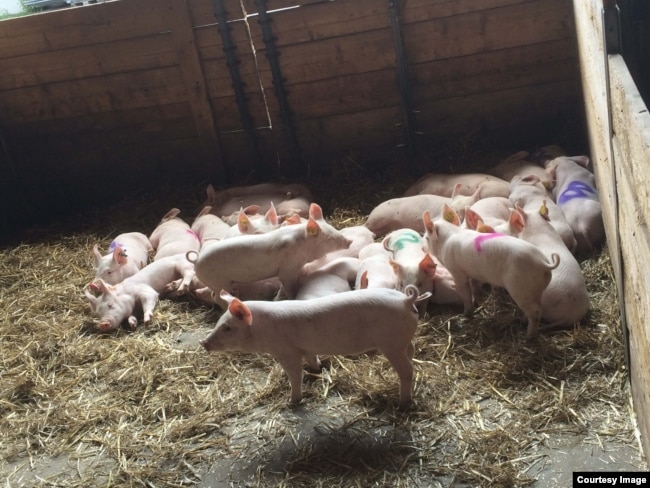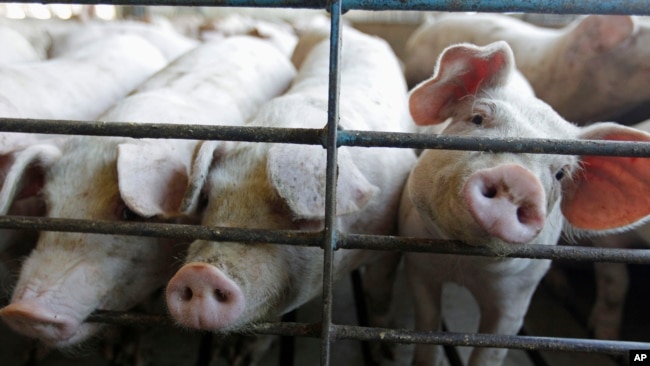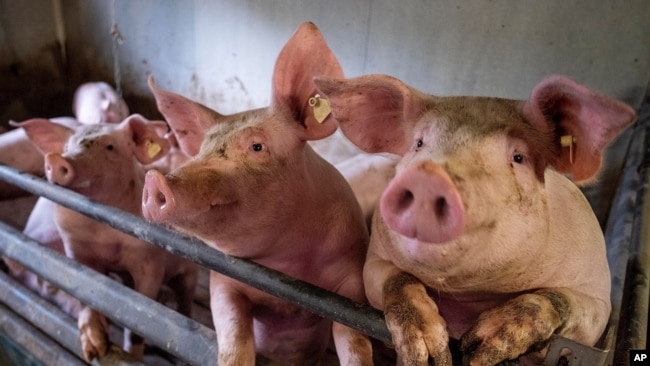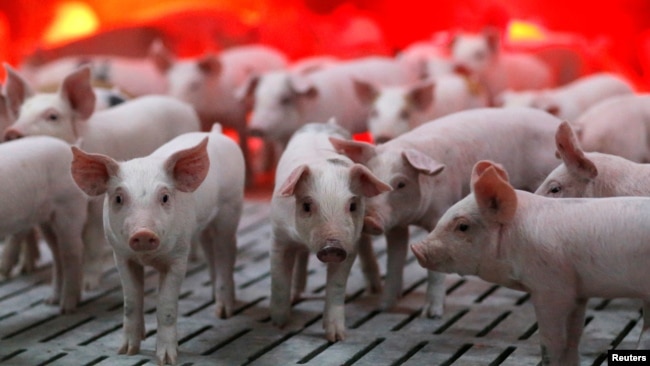豚の気持ち?
ペットなのか家畜かで違うように思います。
ここではどうも家畜のようです。
家畜である豚のwelfare・well-beingのためのアプリ?
なんかしっくりきません!!
良い環境で育てれば、いい肉が出来るという発想なのでしょうか??
とりあえず、VOAで英語を学び、豚ちゃんの心の声を聴ける日を想像します!!
豚の感情を読み解くツールを開発(和訳)
Scientists Create Tool to Interpret Pig Emotions
March 13, 2022
研究者たちは、豚の鳴き声を使って、動物が感じているさまざまな感情を解釈する技術ツールを開発したと発表しました。
このツールは、400頭以上の豚から生涯にわたって収集された数千の録音に基づいています。科学者たちは、動物が経験している可能性のある一連の感情を特定しようとするアルゴリズムを開発しました。
この研究は、農家が動物の生産性と幸福度を向上させるために、動物の感情状態を知るためのアプリの作成につながる可能性があります。
アルゴリズムの作成に至る実験には、国際的なチームが協力しました。コペンハーゲン大学、スイスのチューリッヒ工科大学、フランスの農業・食品・環境国立研究所の研究者がチームを率いています。
この成果は、このほどScientific Reports誌に掲載されました。
豚は高度に発達した発声能力を持つことで知られています。研究者は研究の中で、豚は音を出す時に経験していることに基づいて、異なる音を出すと述べています。そして、これらの音は、さまざまな感情と結びついているのです。感情は一般に”個体が環境状況に対して行う評価によって引き起こされる”と研究者は述べています。
研究の中心は、生まれてから死ぬまで、さまざまな状況に置かれた豚の7,000回以上の音声記録です。録音は、自然環境と実験環境の両方で収集されました。
研究チームは、ブタが関与したさまざまな状況や活動に関連付けるため、音声を整理しました。豚の行動は、ポジティブな場面とネガティブな場面の両方で観察されました。
ポジティブな状況とは、豚が母親から餌をもらっているときや、離れ離れになっていた家族と再会したときなど。負の状況は、分離、豚、去勢または食肉処理のために準備されている間の戦いが含まれています。
また、研究者たちは、制御された環境下で豚を研究しました。この実験では、ある豚にはさまざまな食べ物や物を与え、一方別の豚には与えませんでした。ブタの行動を観察し、ブタの鳴き声や身体的な反応も記録しました。
録音されたものを調べ、さまざまな状況や感情に関連する音の共通点を見出そうとしたのです。その目的は、ポジティブな状況や感情とネガティブな状況を区別することにあります。
研究者たちによると、高い音は通常ネガティブな状況で測定され、低い音はポジティブまたはネガティブな感情のどちらにも関連することがわかったといいます。
エロディ・ブリーファー准教授は、「この研究により、動物の鳴き声が感情を見抜く大きなヒントになることを実証しました」と声明の中で述べています。コペンハーゲン大学生物学部のBriefer准教授は、この研究の主執筆者です。
「ポジティブな状況かネガティブな状況かで見ると、豚の鳴き声に明らかな違いがある 」とブリーファー氏は付け加えます。彼女は、ポジティブな状況では、音はずっと短く、強さのレベルもほとんど変わらないと指摘しています。一方、低音で鳴く”唸り声”の場合、最初は高く、その後低くなるのが普通です。
研究チームは、さまざまな状況で音を認識するようにアルゴリズムを訓練することで、92%の確率で正しい感情を識別することができたといいます。
ブリーファー氏によると、このアルゴリズムは、データを追加して訓練すれば、将来的に豚やその他の家畜の感情の健康状態を改善するための貴重なツールになり得るといいます。
「今、私たちは、農家が動物の福祉を向上させるために使用できるアプリにアルゴリズムを開発したい人を必要としています。」とブリーファー氏は述べています。
Scientists Create Tool to Interpret Pig Emotions
Researchers say they have created a technology tool that uses pig sounds to interpret different emotions the animal is feeling.
The tool is based on thousands of recordings collected from more than 400 pigs throughout their lives. The scientists developed an algorithm that seeks to identify a series of emotions the animals could be experiencing.
The research may lead to creation of an app that farmers could use to learn the emotional state of animals in an effort to improve their productivity and well-being.
An international team cooperated in the experiments that led to creation of the algorithm. The team was led by researchers from the University of Copenhagen, ETH Zurich in Switzerland and France’s National Research Institute for Agriculture, Food and Environment.
The results recently appeared in a study in the publication Scientific Reports.
Pigs are known for having highly developed vocal skills. The researchers state in the study that pigs make different noises based on what they are experiencing at the time they make the sounds. And these sounds can be linked to different emotions. Emotions are generally caused “by the evaluation that an individual makes of its environmental situation,” the study states.
The study centered on more than 7,000 audio recordings of pigs in different situations, from the time they were born until they died. The recordings were collected in both natural and experimental settings.
The team organized the sounds to link them with different situations and activities the pigs were involved in. The behavior of the pigs was observed in both positive and negative situations.
Positive situations included when pigs were being fed by the mother or were reunited with family members after being separated. Negative situations included separations, fights between pigs, castration or being prepared for slaughter.
The researchers also studied the pigs in controlled environments. During these experiments, some of the pigs were given different foods and objects, while others were not. Behaviors of the animals were followed and pig sounds were recorded, along with notes on their physical reactions.
The team examined the recorded material and attempted to identify similarities in the sounds linked to different situations and emotions. The goal was to differentiate positive situations and emotions from negative ones.
The researchers said higher-pitched sounds were usually measured in negative situations, while lower-pitched calls were linked to both positive or negative emotions.
"With this study, we demonstrate that animal sounds provide great insight into their emotions,” Associate Professor Elodie Briefer said in a statement. Briefer, with the University of Copenhagen’s Department of Biology, was a lead writer of the study.
"There are clear differences in pig calls when we look at positive or negative situations,” Briefer added. She noted that in positive situations, the sounds were far shorter, with few changes in strength levels. On the other hand, lower-pitched “grunt” sounds usually began high, but then dropped lower.
By training the algorithm to recognize the sounds in different situations, the team said it was able to identify the correct emotion 92 percent of the time.
Briefer said that with additional data and training, the algorithm can be a valuable tool for helping to improve the emotional health of pigs and other farm animals in the future.
“Now, we need someone who wants to develop the algorithm into an app that farmers can use to improve the welfare of their animals,” Briefer said.
Words in This Story
interpret – v. explain or decide what a particular phrase, action, etc. means
algorithm – n. a set of steps that are followed in order to solve a mathematical problem or to complete a computer process
app – n. a computer program that performs a special function, usually found on mobile phones
evaluation – n. a careful study of something to decide how good or bad it is
positive – adj. a good or happy situation
negative – adj. a bad or sad situation
castration – n. the removal of sex organs
slaughter – n. the killing of an animal for food
pitch – n. a level of a particular sound
insight – n. the ability to understand what something is really like



